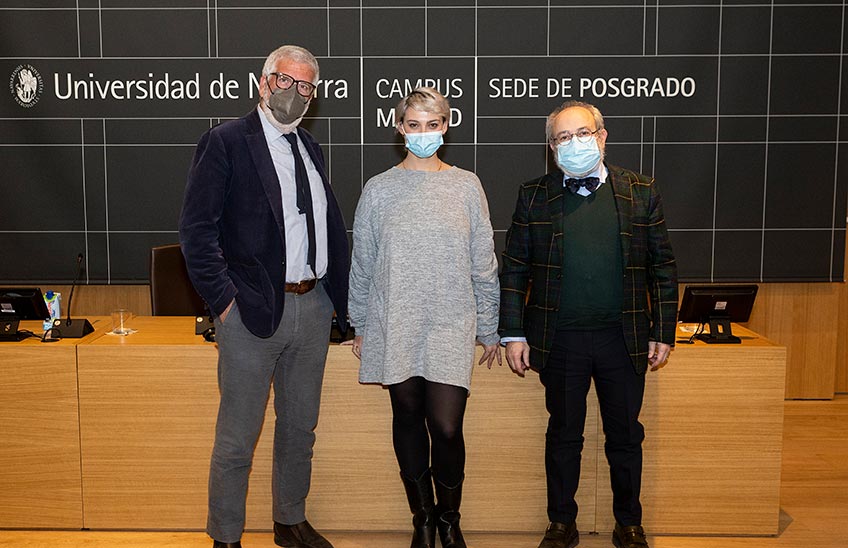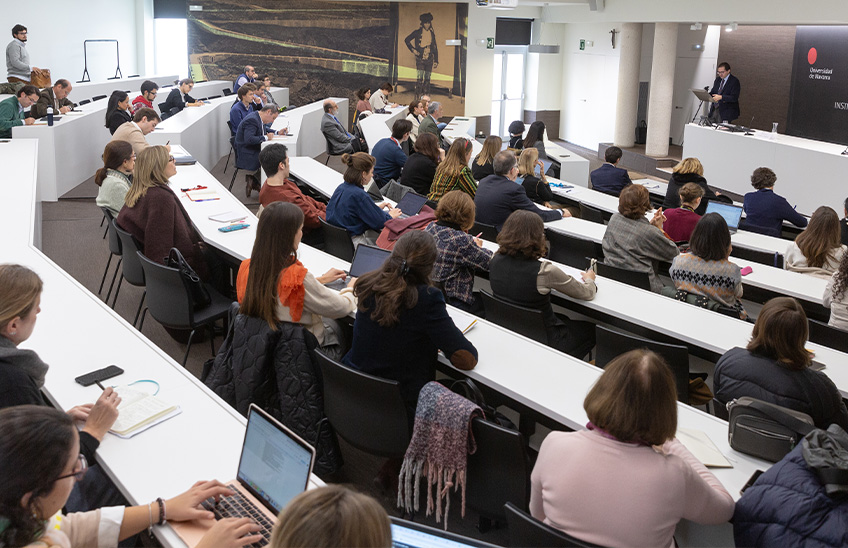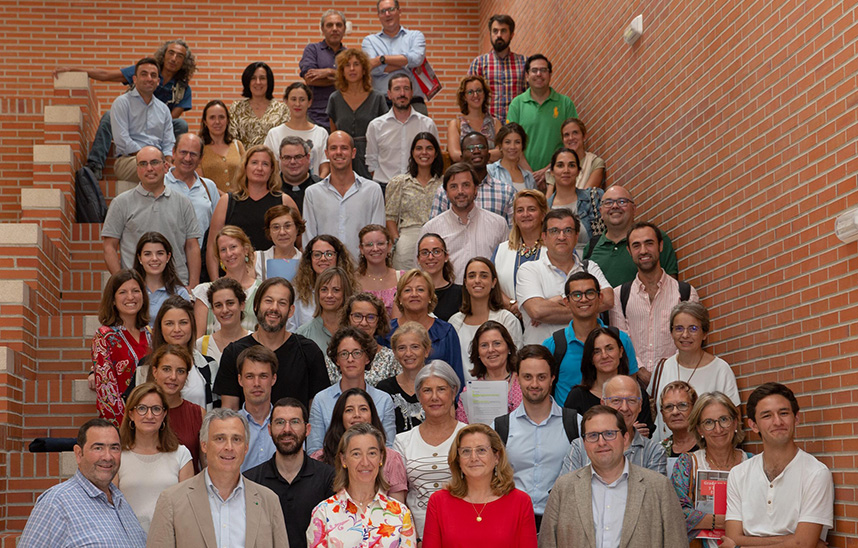"Few things are more transgressive than Christianity, it needs nothing to be contemporary and attractive".
Gregorio Luri, Ricardo Piñero and Lupe de la Vallina reflect on Christianity and its relevance in today's culture at the University.

PhotoJuanJosé Rico/From left to right, Gregorio Luri, Lupe de la Vallina and Ricardo Piñero
09 | 02 | 2022
More than 400 people attended quotation, in person and online, at a meeting organized by the University of Navarra in its Madrid campus. colloquium that the University of Navarra organized at its campus in Madrid, on the occasion of the launching of the Master's Degree in Christianity and Contemporary Culture, which will be launched in the next academic year 2022-23. Gregorio Luri, philosopher and pedagogue; Lupe de la Vallina, photographer; and Ricardo Piñero, Full Professor of Aesthetics and professor at Master's Degree reflected, among other issues, on the validity of the Christian message and its relationship with today's culture, beauty and the search for transcendence in artistic manifestations.
Responding to the question that gave the session its title, "Christianity and contemporary culture: can we wait", Piñero stressed the urgency of asking good questions in order to get to know reality: "We cannot wait. In our culture we find serious problems, but it is not a question of confronting a speech, but of taking up the tradition of what Christianity is and its presence in the contemporary world, which is the one we are in". For his part, Gregorio Luri encouraged us to free ourselves from fear in order to be able to live serenely with reality: "If our times are characterised by anything, it is because they are afraid of the future. In the face of a lost present, Christianity tells us that the right way to look at things is to look at the past, because we have known God's love". An affirmation that Lupe supported by pointing out that when one begins to get to know Christianity, both historically and iconographically, one discovers the references that exist in our culture and how they are closely linked. "If Rosalía or C. Tangana take the images they take and record where they record is not because of pure exoticism but because of the expressive power they have had for 2000 years".
Faced with these affirmations, the question was asked about the need to make the Christian message contemporary, a question to which Lupe responded categorically: "There are few things more provocative and transgressive than Christianity. We don't have to make it contemporary and attractive; it either is or it isn't". In this sense, Luri advocated showing faith through beauty and love. "Christianity has a peculiar relationship with beauty because it is mediated by the particular experience of death. We are surrounded by ephemeral beauty, like a sunset or the embrace of a child, but it is precisely this component that gives it its greatness. In the face of ephemeral beauty there is a special beauty that has conquered death". He also defended the vindication of the soul, affirming that "if we renounce it, we renounce an important part of the individual". For his part, Piñero pointed out that one of the signs of our times is the forgetting of beauty, "because we have disguised it as other things" and that it is inherent to Christianity: "God is beauty and can never go out of fashion. To forget beauty and truth is to stop being who we are. Why give up talking about it if it is a life-changing meeting ?".
The new Master's Degree in Christianity and Contemporary Culture aims to offer an education that allows us to understand contemporary culture from the perspective of Christian humanism and to face the intellectual challenges of today's world. goal . This postgraduate program aims to become an intellectual platform from which anyone can be enriched, not only through the offer professor, but also through the activities that will be organised with intellectuals from different fields, such as round tables, debates and colloquiums. Under the title "Encounters" and with the collaboration of Rialp and IEISA, the next of these sessions will take place on 15 February, at 16:30, at the campus of the University in Madrid, and will include presentations by José María Aresté and Gerardo Sánchez.
Dependent on the School of Philosophy and Letters of the academic center, the Master's Degree has the support of the School of Theology, the Core Curriculum Institute, the Institute for Culture and Society (ICS) and the group Science, Reason and Faith (CRYF), as well as the partnership of professors from several universities. With a modality blended learningThe courses will be taken intensively, one day a week, in the afternoon, at the headquarters of the University of Navarra in Madrid, and will be complemented with online sessions, discussion of readings and personalized tutorials. It will also be possible to take the four modules independently. In addition, there will be an intensive week at the end of each academic year, one year in Madrid and another in Pamplona.
The Master's website is available at the following link.
The full video of colloquium can be seen here.




